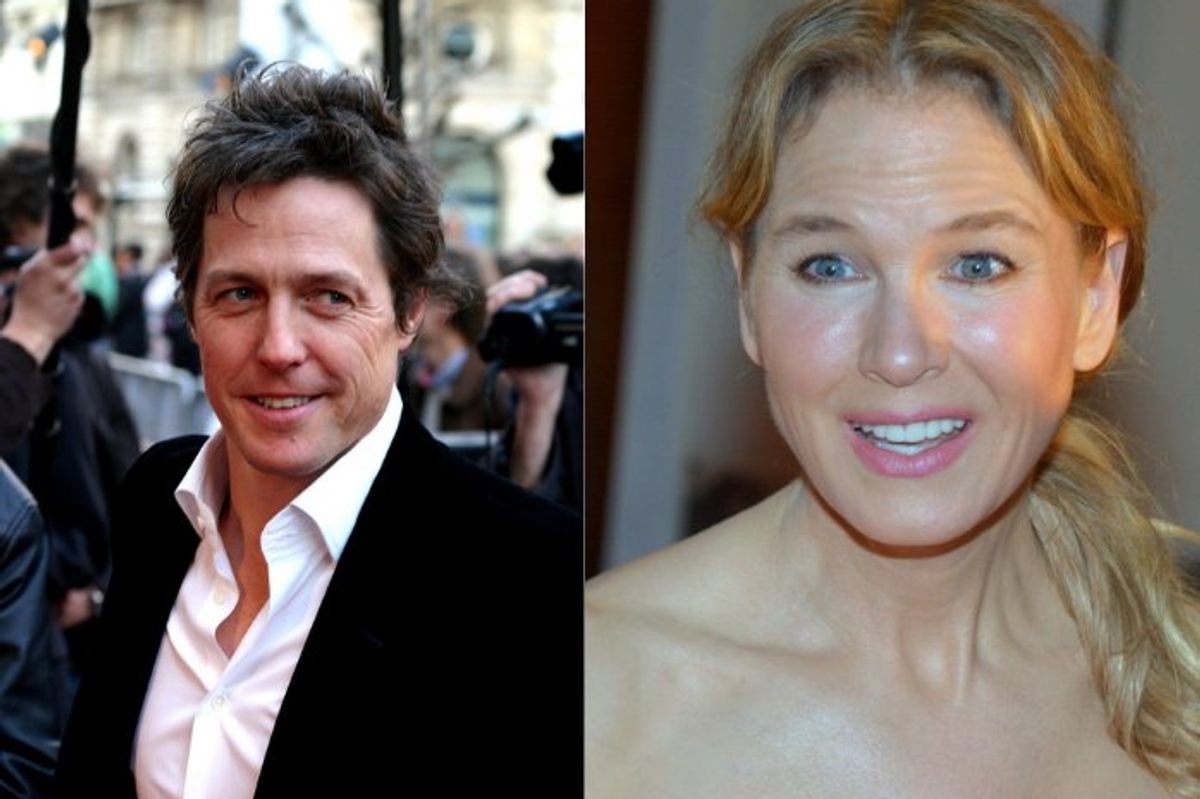Hugh Grant finally tells 'Bridget Jones' co-star Renée Zellweger what he always thought of her
Grant and Zellweger have been friends for over 25 years.
Hugh Grant and Renee Zellweger were co-stars in the hit movie "Bridget Jones's Diary".
Hugh Grant and Renée Zellweger have made movie magic with their roles in the Bridget Jones film series. The two first co-starred in the original Bridget Jones's Diary back in 2001. Since then, there have been three additional Bridget Jones movies: Bridget Jones: The Edge of Reason (2004), Bridget Jones's Baby (2016), and Bridget Jones: Mad About the Boy (2025)—although Grant did not appear in 2016's Bridget Jones's Baby.
The result has been a long-standing friendship between the actors off-screen, with Grant developing a soft spot for Zellweger. During an appearance on The Graham Norton Show in 2016, Hugh agreed with his original assessment that she's "delightful. Also far from sane. Very good kisser."
When pressed, Hugh jokingly said, "She is genuinely lovely, but her emails are 48 pages long. Can't understand a word of them."
- YouTube www.youtube.com
Now, ten years later, Renée is returning to her Bridget Jones character, and the two reunite for a piece called "Bridget Jones: Mad About the Boy" for British Vogue. Apparently in their OG Bridget Jones days, had tons of questions between on-set shots for Renée. Examples include: "If you had to marry one of today's extras, who would it be?" and "Who is a better kisser, me or Colin Firth?"
This time, there was a new slew of questions for each actor. Here are a few key things we find out:
What did Hugh always think of Renée?
He says candidly (of course), "With a lot of other actors, you think they're really great, and then suddenly you see a little glint of steely, scary ambition, and you realize this person would trample their grandmother to get what they want in this business. But I've never seen that glint coming off you. So either it's very well disguised, or you are quite nice."
What does Renée really think of Hugh?
"You're hilariously brilliant at everything you hate. And, though you hate humans, you're a very good and loyal friend. I like you very much. And I love working with you."
And during a February 2025 interview on TODAY while promoting Bridget Jones: Mad About the Boy, Jones shared about Grant, "He's mastered cute-grouchy for sure...I mean, 25 years of coming together and catching up through this experience, I've come to know him in a really lovely way... I just adore him."
- YouTube www.youtube.com
What did Hugh really think of her English accent?
After discussing Renée's dialect coach, Hugh tells her that her attempt at an English accent is…"perfect."
Why does the Bridget Jones franchise remain so appealing?
Hugh says, "In a nutshell, I say it's an antidote to Instagram. Instagram is telling people, especially women, 'Your life's not good enough.' It's not as good as this woman's or that woman's, making you insecure. Whereas what Helen (the writer) did with Bridget is celebrate failures, while making it funny and joyful."
Renée makes some jokes and then says, "I think maybe folks recognize themselves in her and relate to her feelings of self-doubt. Bridget is authentically herself and doesn't always get it right, but whatever her imperfections, she remains joyful and optimistic, carries on, and triumphs in her own way."
@thisisheart Renee Zellweger on what goes down in her email thread with Hugh Grant! #bridgetjones #reneezellweger #hughgrant #Fyp #foryou #celeb #movies
What does Hugh think of Renée's fashion?
After asking if people in general should be a "bit more stylish," Hugh tells Renée she's "very chic." Renée pushes back with, "I'm wearing a tracksuit." To which Hugh retorts, "Yeah, but a sort of PRICEY one."
And finally, those emails:
"You have sent me the longest emails I've ever received. I can't understand a single word of them. They're written in some curious language that I can't really understand."
"No!" Renée exclaims. "If you reference something in your emails that makes me laugh…I will circle back to that. And if you've forgotten that you wrote it, I don't think I should be held accountable for that!"
This article originally appeared last year. It has been updated.

